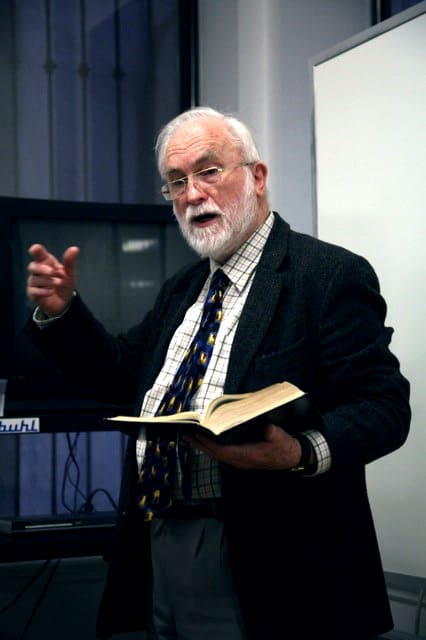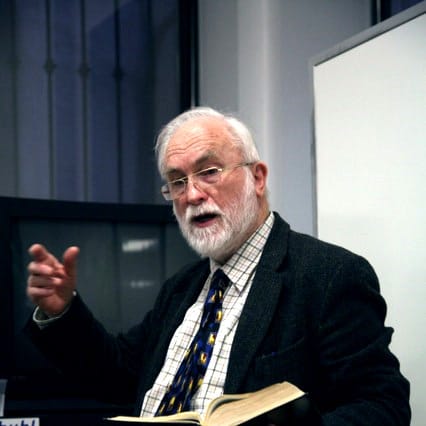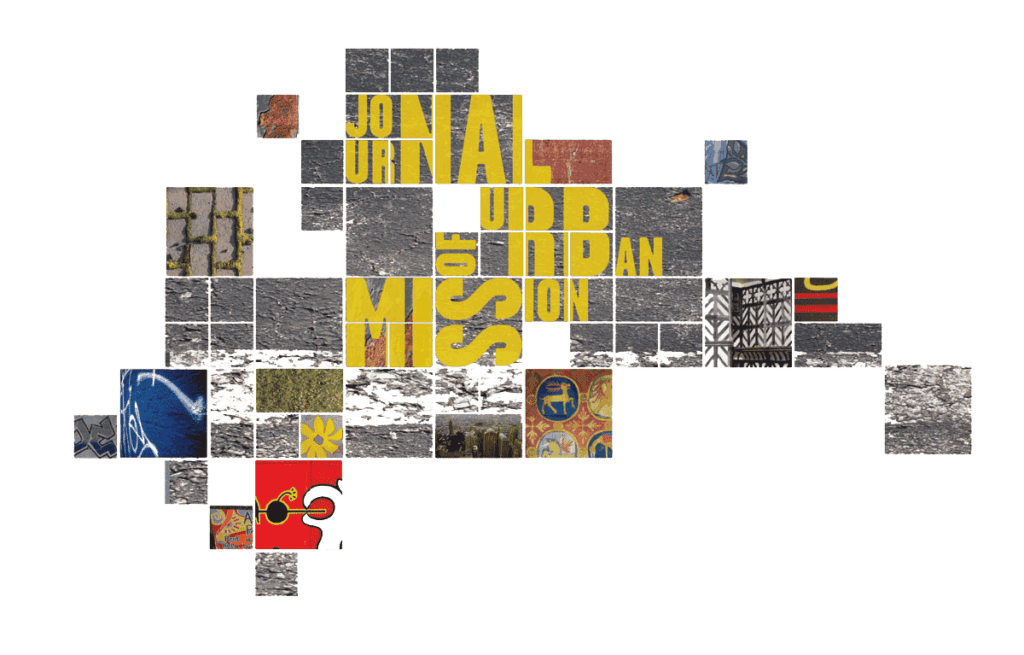Christianity is inherently polycentric. Africa, Asia and Latin America are important not just numerically for the church, but theologically. These are some of Andrew F. Walls’ insights into the cross-cultural nature of the Christian faith. He is an important guide who will help us understand global Christianity today as well as the nature of the church’s mission in the 21st century.
Originally published in Catalyst 31, no. 3 (2005); used with permission.

Andrew F. Walls is one of the most important interpreters of Christianity and its missionary role in our time. His understanding of the church’s transformation from Christendom to world Christianity cuts across disciplines of history, theology, mission studies, and biblical exegesis, and runs deep into the life of the church. M. Noll offers the assessment that “no one has written with greater wisdom about what it means for the Western Christian religion to become the global Christian religion than A.F. Walls….” Presently two volumes, both published by Orbis, collect some of his most important essays, The Missionary Movement in Christian History: Studies in the Transmission of Faith (1996) and The Cross-Cultural Process in Christian History: Studies in the Transmission and Appropriation of Faith (2002).
Walls’ Career
Due to the Depression and his father’s search for work, Walls was born a Scot in “exile” in New Milton, England, in 1928. He attended Oxford, where he received a BA (1948), a MA (1952), and a BLitt (1954). At Oxford, he was a student of both theology and church history, and focused his graduate work on Patristic studies, studying with F.L. Cross.
In 1952, Walls assumed the roles of the Secretary and Librarian of Tyndale House located in Cambridge, a center of evangelical biblical scholarship associated with the Inter-Varsity student movement. Such titles belied their administrative responsibility, and this time proved instrumental in ensuring its continued existence. During the Tyndale years, F.F. Bruce became a friend and provider of counsel, a relationship that continued until the end of his life. Perhaps most revealing, this period brought to the fore one of Walls’ chief characteristics, that of encouraging the personal development and scholarship of others.
In 1957, Walls moved to Sierra Leone where he became a Lecturer in Theology at Fourah Bay College, which at that time provided both a university education and ministerial training. Then, in 1962 he became the head of the Department of Religion at the University of Nigeria, Nsukka. Life in Africa is the background for understanding Walls’ unique contributions to the church and academy. While teaching church history to seminarians in Sierra Leone, he underwent a new way of seeing, a “conversion” of sorts. “I still remember the force with which one day the realization struck me that I, while happily pontificating on the patchwork quilt of diverse fragments that constitutes second-century Christian literature, was actually living in a second-century church. The life, worship and understanding of a community in its second century of Christian allegiance was going on all around me. Why did I not stop pontificating and observe what was going on… The experience changed this academic for life; instead of trying to extrapolate from that ancient corpus of literature and apply it, I began to understand the second-century material in light of all the religious events going on around me.”1
As a historian of Christianity, Walls made clear that Africa’s marginalization was untenable. Practically and conceptually, such a move raised broader questions about the western-centered church history syllabus.
Joined to this was a new learning inquiry—the study of Christianity, religion, and society in Africa—into the world around him. As a historian of Christianity, Walls made clear that Africa’s marginalization was untenable. Practically and conceptually, such a move raised broader questions about the western-centered church history syllabus.
Returning to Scotland in 1966, Walls began a teaching post at the Univ. of Aberdeen that would continue to 1985. At Aberdeen he taught in the divinity school, and later, opened a university department of religion. In 1982, he founded the Centre for the Study of Christianity in the Non-Western World (CSCNWW). Beginning in 1986, Walls and the CSCNWW found a home at the University of Edinburgh. The CSCNWW embodies Walls’ commitment to building an intercultural learning community where matters of the global church are explored. Along the full course of his academic career, Walls founded and edited a number of journals and had leading roles in mission and research societies.
Following retirement from Edinburgh, Walls has held a number of distinguished academic posts. From 1997 to 2001, he served as guest professor of Ecumenics and Mission Research at Princeton Theological Seminary. In 2000, he was the inaugural holder of the Monrad Family Visiting Chair of World Christianity at Harvard University Divinity School. His teaching also continues at the Akrofi-Christaller Memorial Centre in Akropong, Ghana, directed by K. Bediako.
A wide-ranging commitment to public life and the arts in Scotland was considerably important for Walls, and in 1987 he was awarded the Order of the British Empire. Subsequent to his latest “retirement,” he has maintained an apparently ceaseless schedule of travel, lecturing, and consultations. In 2003, Walls celebrated fifty years of marriage to Doreen and fifty years as a lay Methodist preacher.
Telling the Story of the Church
Christ’s incarnation is about cultural specificity, and ultimately, diffusion among cultures and traditions; thus, the expansion of Christianity as a cross-cultural story.
In Walls’ most recent collection of essays, The Cross-Cultural Process in Christian History, as well as his other writings, a recurring story is told of “the expansion of the Christian faith by its interaction with different cultures and even languages.”2 This “interaction” is the cross-cultural story of Christianity. As Walls develops the narrative, the cross-cultural development of the church is connected to the incarnation, a historical event leading to a historical process. Christ’s incarnation is about cultural specificity, and ultimately, diffusion among cultures and traditions; thus, the expansion of Christianity as a cross-cultural story.
As told by Walls, the key development in the cross-cultural story is the Gentile mission of the Antioch church, which pressed forward with the gospel across cultural barriers, and the Jerusalem council in Acts 15, which ensured the future of the church. As Walls recounts the gathering, “Finally, after deep deliberation, the leaders of the Jerusalem community (swayed, in the Acts account, not by Paul’s torrid eloquence but by the measured judgments of the seniors who had known Paul the best, Peter and James the Just) accepted the essentials of Paul’s argument. Though circumcised, Torah-keeping Jews themselves, they recognized that Gentile believers in the Messiah could enter Israel without becoming Jews. They were converts not proselytes.”3 From this, Walls concludes, “It is hardly possible to exaggerate the importance of this early controversy and its outcome; it is a pivot on which Christian history turns…” for it “built the principle of cultural diversity into Christianity in perpetuity.”4
This cross-cultural narrative situates contemporary developments in the world church and mission. Walls reads Scripture in a way that helps us see why Christianity is inherently polycentric, why Africa, Asia and Latin America are important not just numerically for the church, but theologically. That the church is a multitude, and perhaps never as much as today, is in Walls’ view a natural consequence of the story of the church in the book of Acts. And because the people of God are not holders of a territorial faith, mobility and mission becomes the church, its continual source of renewal. In summary, there are good reasons why we might characterize Walls’ approach as narrative theology or missiology.
Three Key Ideas
In Walls’ words, and arising from his experiences in Africa and Scotland, Christianity is undergoing a gravitational shift from the western to the non-western world. While an essayist, there is a continuity of ideas throughout his writing intended to help us understand what is taking place in the global church. Among them are three key ideas: Christianity as serial in development, conversion as the turning what is there to Christ, and translation as the process of gospel appropriation.
- The spread of Christianity has not been progressive, but serial in development–the heartlands of Christian witness shifting, and the margins becoming the new centers.
- Conversion (as opposed to proselytism) is the appropriation of Christ into thought, life, culture, and mind.
- Conversion leads to the embodiment of faith in diverse cultures, which is translation (to be distinguished from contextualization).
The first key idea in Walls’ thought is that the spread of Christianity has not been progressive, but serial in development. That is, Christian expansion is not linear in movement, but rather a series of movements forward and backward, of advancement and recession. Such continual shifting, in Walls’ view, is due in large measure to its vulnerability manifest in the incarnation, cross, and the earthen vessel. Historically and right before our eyes, the heartlands of Christian witness shift, the margins become the new centers.
Conversion, the second key concept in Walls’ thought, is the appropriation of Christ into thought, life, culture, and mind. Conversion is “turning” what is already there to Christ, not adding something new to something old. New life in Christ is not about cultural uniformity, which comes from proselytizing, but always about fresh appropriations or translations of the Christian faith. The distinction between the convert and proselyte, Walls proposes, is crucial, as the latter simply and wrongly is forced to repeat a foreign cultural form of belief and practice. This carries much importance for the practice of cross-cultural ministry.
Thus conversion leads to the embodiment of faith in diverse cultures, which Walls argues in the third and perhaps most important key idea, is translation. Theologically, God is a translator, centrally as Christ took on human form. Translation is linguistic and cultural, and is always taking place. This notion of translation, very different from “contextualization,” is much more enriching for the wider church, yet also profoundly challenges existing paradigms of theology.
By way of one consequence, Walls takes Christianity to be both a captive to and liberator of cultures. Thus the translation of the gospel into a culture never occurs without a critique of culture. Transmission is certainly not an uncomplicated process, but ultimately Walls believes that translation produces a dynamic of theological integrity.
Walls’ reading of Christianity operates on many levels, but it always comes back the person and work of Jesus. “The bewildering paradox at the heart of the Christian confession is not just the obvious one of the divine humanity; it is the twofold affirmation of the utter Jewishness of Jesus and the boundless universality of the Divine Son. The paradox is necessary to the business of making sense of the history of the Christian faith. On the one hand it is a seemingly infinite series of cultural specificities—each in principle as locally specific as that utterly Jewish Jesus. On the other hand, in a historical view, the different specificities belong together. They have a certain coherence and interdependence in the coherence and interdependence of total humanity in the One who made humanity his own.”5
This experience of Christianity, at once local yet profoundly catholic, continues as women and men follow Christ throughout the world. Such an ecclesiology brings profound implications for theology.
Scholar Pilgrim
The body of work that Walls has developed represents a journey of listening and quest for understanding. He shows us many of the reasons why we live in a moment for the church that is filled with immense opportunity for witness and mission.
Walls is known not only for his pioneering scholarship, but also his generosity of spirit, time, and intellectual energy, especially with his students. One would be remiss, however, not to mention his sense of humor, theatrical gifts, and appreciation for literary works that range from Austen to Potter. But it is Walls’ devotion to a larger story that shapes his person most profoundly. As B. Stanley eloquently writes of Walls: “The scholar pilgrim will, one suspects, never be content to hang up his staff. He has been a true Methodist itinerant, an evangelist who has given his life to the challenge of expounding to a frequently resistant and insular theological constituency the full implications of the words of C. Wesley, ‘the arms of love that compass me would all mankind embrace.’ Countless Christians of many traditions and all continents have much cause to be grateful to God for A.F. Walls.”6
If as a seminarian you sense the need for an ecclesiology and missiology able to operate with integrity and expectation in the 21st century, then the work of A. Walls is an invaluable guide. If you are looking for a model of a committed life, of scholarship in service of the church, then Walls is an exemplar for roads we have yet to travel.
Notes
1 Missionary Movement, xiii.
2 Cross-Cultural Process, 9-10.
3 “Old Athens and New Jerusalem: Some Signposts for Christian Scholarship in the Early History of Mission Studies,” International Bulletin of Missionary Research 21 [4, 1997] 147.
4 148.
5 Missionary Movement, xvi.
6 “Profile: Andrew Walls,” Epworth Review 28 [4, 2001] 25.


